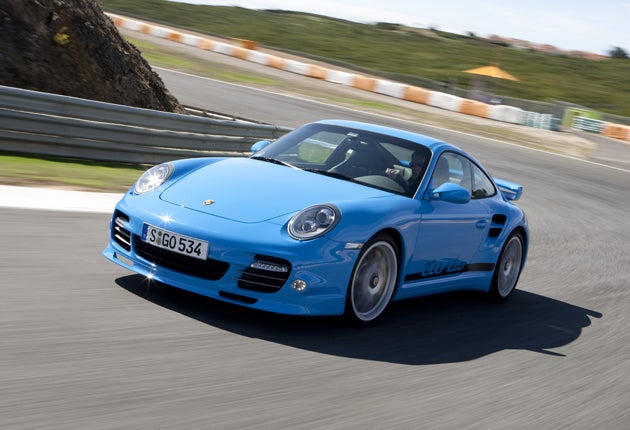Porsche 911
It costs £100,000 but 'launch control' will take you to 60mph in a few seconds. John Simister drives a supercar that's also available in green

Your support helps us to tell the story
From reproductive rights to climate change to Big Tech, The Independent is on the ground when the story is developing. Whether it's investigating the financials of Elon Musk's pro-Trump PAC or producing our latest documentary, 'The A Word', which shines a light on the American women fighting for reproductive rights, we know how important it is to parse out the facts from the messaging.
At such a critical moment in US history, we need reporters on the ground. Your donation allows us to keep sending journalists to speak to both sides of the story.
The Independent is trusted by Americans across the entire political spectrum. And unlike many other quality news outlets, we choose not to lock Americans out of our reporting and analysis with paywalls. We believe quality journalism should be available to everyone, paid for by those who can afford it.
Your support makes all the difference.Does power corrupt? It certainly creeps up on you, insidiously. Two decades ago, any car with over 200bhp was thought daringly potent, but now even a Mini or a Renault Clio can have that sort of output.
Even longer ago – 35 years to be exact – Porsche launched the car whose name soon symbolised all that was racy, potent, hi-tech – a name then hijacked for items as varied as a vacuum cleaner and an aftershave.
The Porsche 911 had 260bhp, and how we gasped. Now there's a new 911 Turbo (at £101,823 to £109,048) and it has nearly twice as much power. Corruption surely beckons in myriad ways, but absolution may yet be at hand. Let's find out.
All that said, this latest incarnation has, at 500bhp, just 20bhp more than its immediate predecessor, but it also produces less carbon dioxide. It can't help but do so, because the engine is a twin-turbo version of the all-new, direct-injection unit already seen in the other flat-six-powered Porsches. This is especially good news for a turbocharged engine, because it remedies the type's biggest failing: a soft response to the accelerator before the boost builds up.
So here I am, pointing the new Turbo's nose along some twisting roads in the hills close to the Estoril racetrack, near Lisbon. There's lots of scope for uncovering any discontinuity between accelerator and acceleration, but none has emerged. I'm in a cabriolet – roof-down, the sound-effects are splendid – and the 911 hurtles forward with precise but relentless force with every flex of my right foot.
Initially the sound is the usual smooth-grained, slightly metallic, flat-six blare, but all at once this is overwhelmed by a colossal rush of air being blasted out of the exhaust pipes. Each upshift brings an additional pop and crackle to the aural mix, for this car has the PDK gearbox option, and it automatically shuts the throttles instantly. PDK – Porsche Doppelkupplungs, or double-clutch – has replaced the unloved Tiptronic automatic, and it works much more quickly, precisely and smoothly, while soaking up less power and improving fuel efficiency.
The 911 Turbo has a top speed of 193mph. It can also reach 62mph from a standstill in as little as 3.4 seconds, if you have both the quick-shifting PDK and the Sport Chrono pack, which includes a "launch control". With this you hold the car on the brake, floor the accelerator, hear the engine speed shoot up then stabilise, release the brake and kapow! An astonishing surge of energy hurls the 911 into the distance as you cling to the wheel and your innards wrap themselves around your vertebrae.
It's a bit too easy, actually. Out on the road, the PDK's shifts take on a video-game quality, and this encourages a worrying disengagement with your surroundings. Not that the 911 is likely to bite you if you arrive too quickly at a corner. It has four-wheel drive and a plethora of stability systems, all combining to counter the unwelcome effects of too much weight in the tail and maximise the welcome ones, specifically the astonishing traction out of the corner.
Even this cleverness can't fully disguise the innate 911-ness of the physics involved, though. You can feel the nose being pushed momentarily wide as you accelerate in a tight bend, until the four-wheel drive pulls it in. And later, on the Estoril track in the manual coupé, I find that the tail edges out under a surge of power just as it has always done. The difference is that nowadays, the 911 lets you have fun without the fear.
One of the best things about a really quick 911 is that it combines true supercar performance with properly compact dimensions and a good view out, thus making it thoroughly usable. The new engine's greater greenness offers some absolution, but I am nevertheless corrupted. Absolutely.
The Rivals
Aston Martin V12 Vantage: £135,000.
Aston's 510bhp V12 squeezed into its smaller model line makes for a bombastic drive, but neither steering nor accelerator response feel natural.
Jaguar XKR: £72,400.
Efficient supercharged V8 generates same power as Aston V12. Responsive auto gearbox, lovely ride and handling, great looks. A bargain.
Maserati Gran Turismo S: £88,005.
Makes do with a 433bhp V8, but it's plenty. Curvy looks and potent sound melt your heart. Sequential transmission is old-tech now.
Join our commenting forum
Join thought-provoking conversations, follow other Independent readers and see their replies
Comments